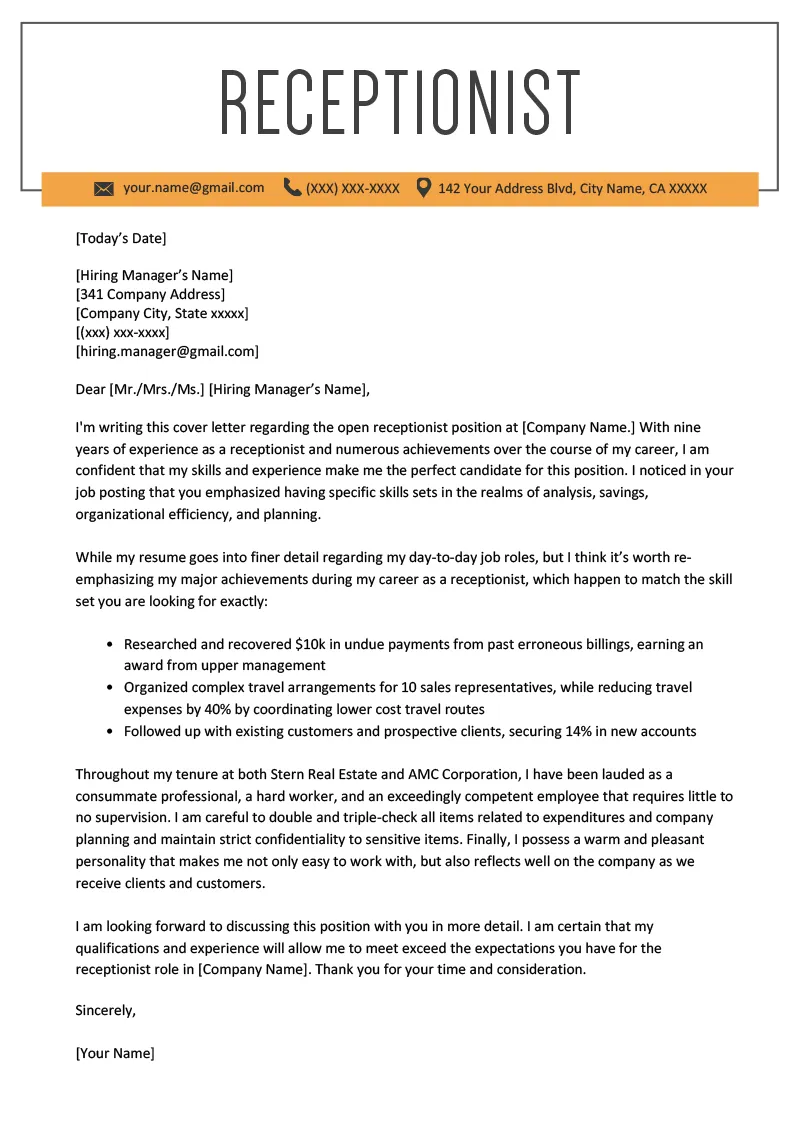Crafting Your Hotel Receptionist Cover Letter
A well-crafted cover letter is your first opportunity to make a positive impression on a potential employer. For a hotel receptionist position, your cover letter acts as a crucial introduction, providing a glimpse into your personality, skills, and enthusiasm. It complements your resume and offers a space to elaborate on your qualifications, explaining why you’re the perfect fit for the role. The goal is to capture the hiring manager’s attention and convince them to call you for an interview. Avoid generic templates. Instead, personalize each letter, demonstrating genuine interest in the specific hotel and role. This shows that you’ve taken the time to understand the requirements and are genuinely interested in the opportunity. Remember, your cover letter is not just a formality; it’s a marketing tool that showcases your unique value proposition.
Highlighting Relevant Skills for Hotel Receptionist
Your cover letter should highlight the skills most relevant to a hotel receptionist role. These skills are the building blocks of a successful career in hospitality and should be presented in a way that captures attention. Focus on those qualifications which you have and which are relevant to the job offer, showing that you understand what the employer needs. Do not just list skills; provide brief examples of how you’ve used them effectively. This approach makes your claims more credible and memorable. It transforms the mere presentation of your skills into a compelling narrative of your capabilities, making you a strong candidate.
Customer Service Experience
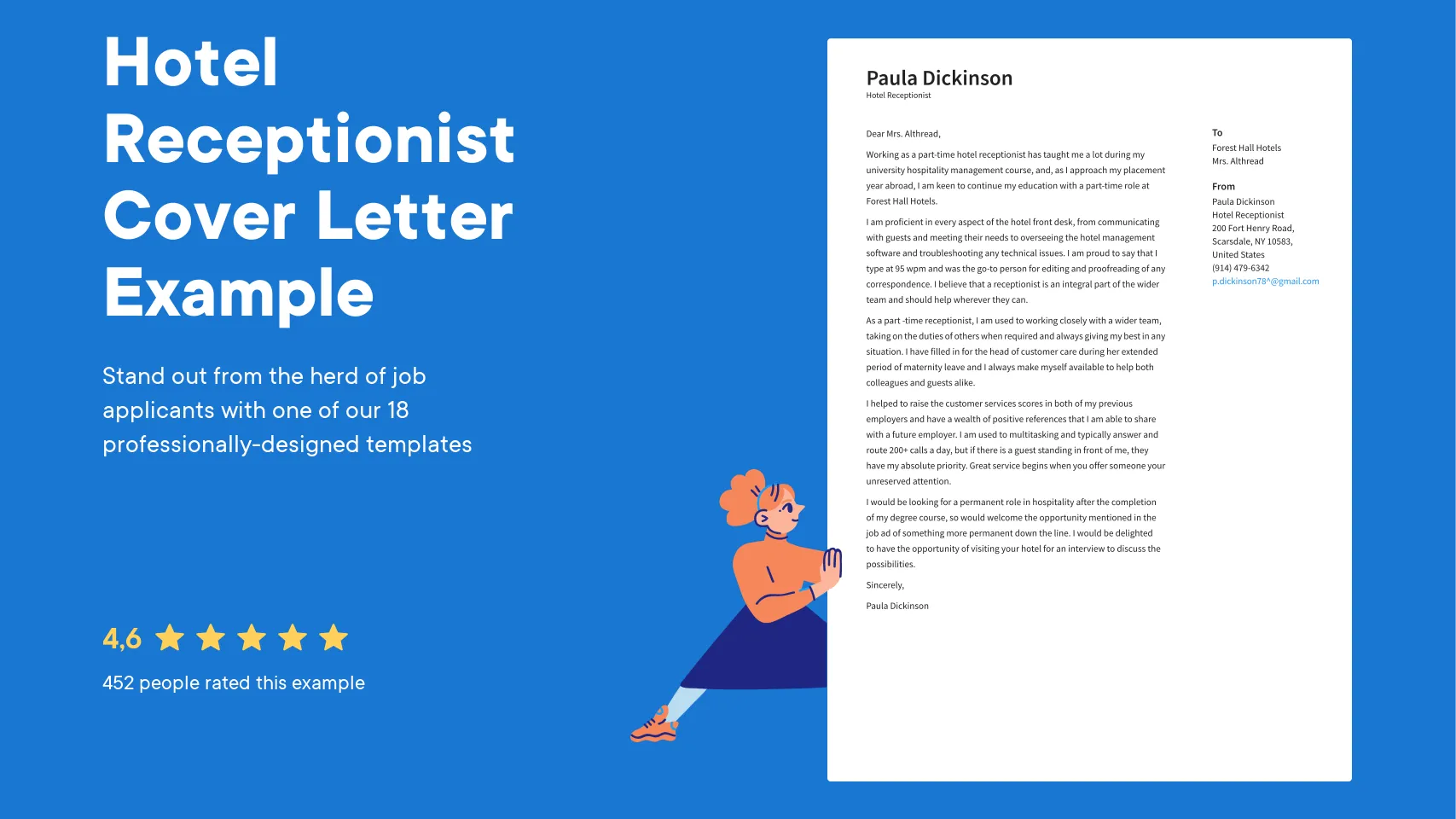
Customer service is at the heart of the hotel industry. Highlight your experience in this area, emphasizing your ability to handle guest inquiries, resolve issues, and create positive experiences. Describe specific instances where you went above and beyond to assist a customer or resolve a problem. For example, you could mention how you handled a complaint professionally, turned a negative situation into a positive one, or consistently received positive feedback from customers. Use action verbs like ‘assisted,’ ‘resolved,’ and ’ensured’ to show your proactive approach to customer service. This demonstrates your understanding of the importance of guest satisfaction and your commitment to providing excellent service.
Communication Skills
Exceptional communication skills are a must-have for any hotel receptionist. Showcase your ability to communicate clearly, effectively, and professionally, both verbally and in writing. Provide examples of how you have communicated with guests, colleagues, and supervisors in the past. Mention your experience in handling phone calls, emails, and face-to-face interactions. If you are multilingual, make sure to include this information, as it can be a significant asset in the hospitality industry. Emphasize your ability to listen actively, understand different perspectives, and adapt your communication style to suit the audience. This will demonstrate that you can build rapport with guests from diverse backgrounds.
Organizational Abilities
A hotel receptionist must be highly organized to manage various tasks simultaneously. Highlight your organizational skills by mentioning your experience in handling reservations, managing guest information, and coordinating with other departments. Give examples of how you’ve used organizational tools, such as spreadsheets or scheduling software, to manage tasks effectively. Focus on your ability to prioritize tasks, manage time efficiently, and stay calm under pressure. For instance, describe how you have handled multiple check-ins or check-outs during peak times. By showcasing your organizational skills, you will convince the recruiter that you are capable of dealing with a busy hotel environment.
Showcasing Your Personality in the Cover Letter
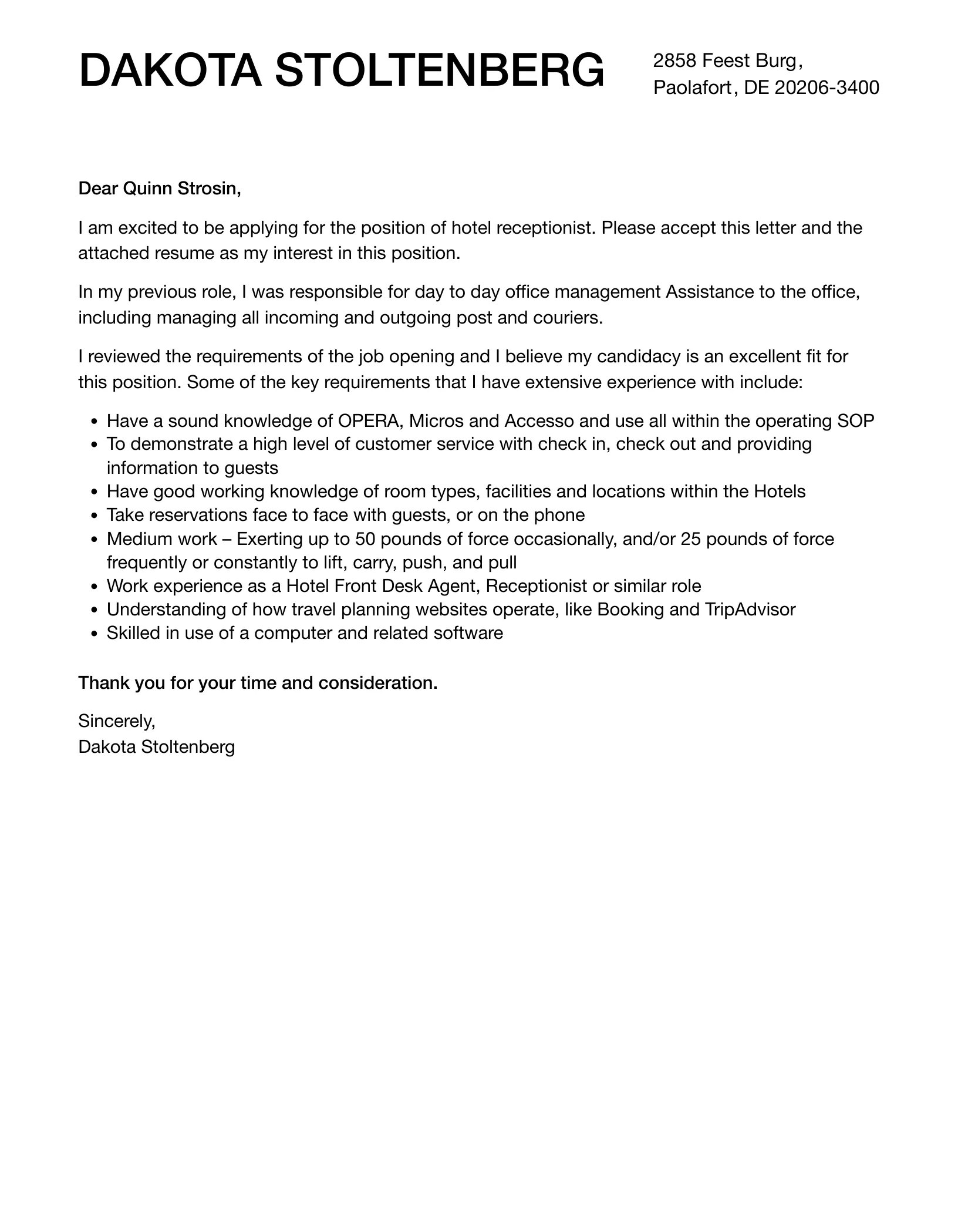
While skills are important, your personality can make you stand out. Use your cover letter to show your enthusiasm, warmth, and genuine interest in hospitality. Share personal anecdotes that demonstrate your friendly and approachable nature. Perhaps mention a time you went above and beyond to assist a guest or a situation where your positive attitude helped resolve a problem. Avoid generic statements. Instead, inject personality into your writing to allow the hiring manager to get a sense of who you are. This will make your application more memorable and make you a human applicant, which will help you in the competition.
Emphasizing Your Enthusiasm for the Role
Show your genuine enthusiasm for the specific hotel and the receptionist role. This is your opportunity to demonstrate that you are genuinely interested in this particular job and aren’t just sending out generic applications. Research the hotel, its values, and its unique selling points. Then, tailor your cover letter to highlight how your skills and experience align with the hotel’s mission and culture. Mention specific aspects of the role that excite you, and why you believe this is the right opportunity for you. This level of detail shows that you are serious about the position and that you are willing to go the extra mile.
Demonstrating Knowledge of Hotel Operations
Show that you understand the workings of a hotel. If you have previous experience, briefly describe your familiarity with front desk procedures, reservation systems, or guest service protocols. If you don’t have prior experience, express your eagerness to learn and your understanding of the hotel’s operational needs. Mention any relevant knowledge, such as familiarity with common hotel systems, room types, or industry terminology. Doing so will make you seem more confident. This knowledge helps the hiring manager see that you understand the industry and can hit the ground running.
Mentioning Relevant Software Proficiency
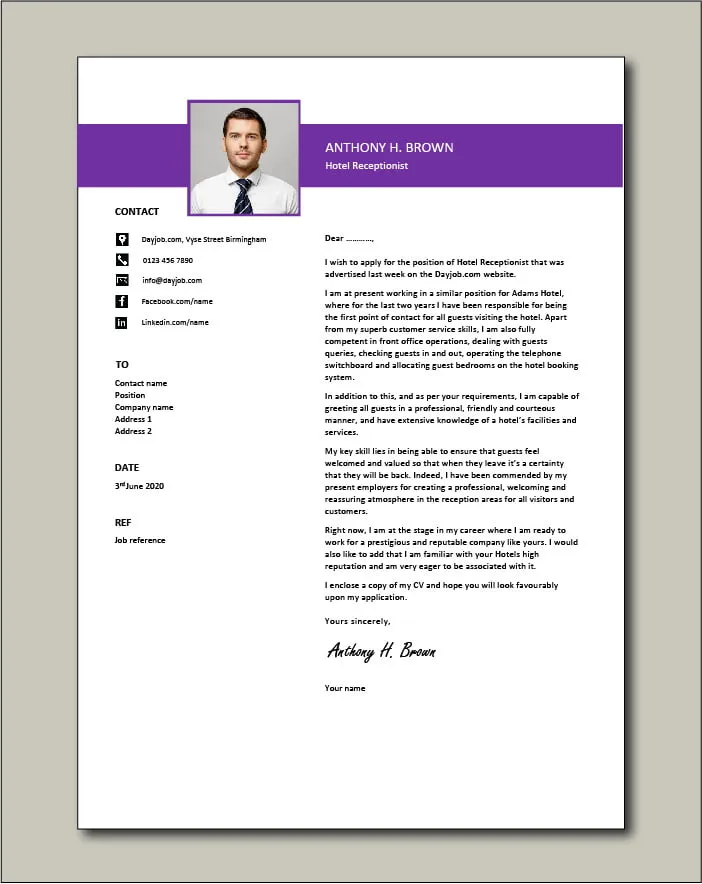
Hotel receptionists often use specialized software for reservations, check-ins, and other tasks. In your cover letter, mention any relevant software or systems you are familiar with, such as: Property Management Systems (PMS), such as Opera or Protel, Customer Relationship Management (CRM) software, Microsoft Office Suite, particularly Word and Excel. Include your proficiency level (e.g., proficient, intermediate, basic) to give the hiring manager a realistic assessment of your skills. Emphasize your willingness to learn new systems and adapt to changing technologies, as hotels frequently update their software.
Tailoring Your Cover Letter to the Hotel
Generic cover letters are easy to spot and often discarded. Tailor each cover letter to the specific hotel you’re applying to. This shows that you have done your research and are genuinely interested in the property. Mention the hotel’s name, its unique features, and what you admire about its brand. Refer to the hotel’s website, social media pages, and any online reviews to gather information. If possible, address your letter to a specific hiring manager by name. This level of personalization indicates that you have invested time and effort into your application and are committed to making a strong impression.
Researching the Hotel’s Values and Mission
Before you start writing, research the hotel’s values, mission, and culture. This information will allow you to tailor your cover letter to fit their specific needs. Review the hotel’s website, social media profiles, and any published reports. Identify their key priorities, such as customer service, sustainability, or community involvement. Integrate these values into your letter. For example, if the hotel is known for its commitment to environmental practices, mention your interest in sustainable hospitality. If the hotel emphasizes excellent customer service, emphasize your customer service skills and how you align with their values.
Addressing the Hiring Manager Directly
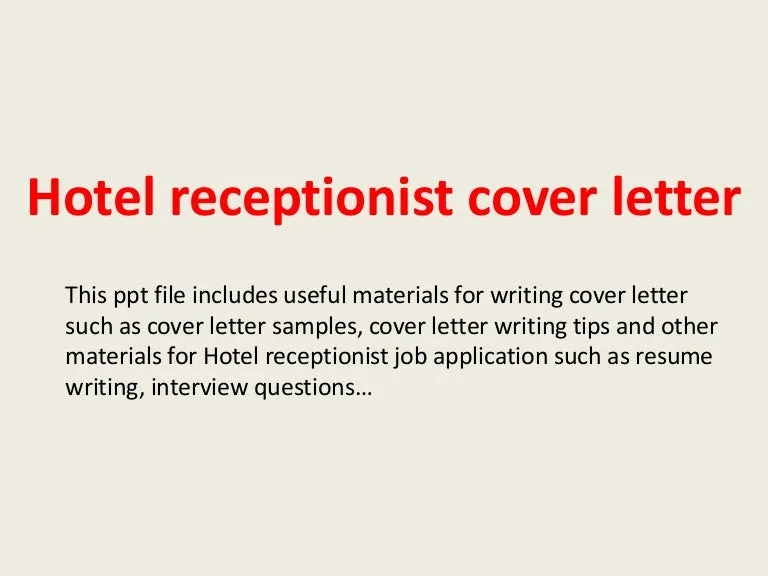
Whenever possible, address your cover letter to a specific person, like the hiring manager. If you can’t find a name, try calling the hotel or checking LinkedIn. Addressing the letter to a specific individual demonstrates initiative and attention to detail. If you can’t find a name, use a professional greeting, such as ‘Dear Hiring Manager’. Avoid generic greetings, such as ‘To Whom It May Concern’, as they can make your letter seem impersonal. If you have the name, make sure to spell it correctly. Double-checking the recipient’s name shows you have taken the time to prepare the letter properly.
Proofreading and Formatting Your Cover Letter
Your cover letter is a reflection of your professionalism. Proofread it carefully to ensure that it is free of errors in grammar, spelling, and punctuation. Errors can create a negative impression and undermine your credibility. Use a professional format that is easy to read. Choose a clear font like Arial or Times New Roman, and use a standard font size (11 or 12 points). Ensure that the spacing is consistent and that the text is well-organized. Before sending your cover letter, consider asking a friend, family member, or career counselor to review it for errors and offer feedback.
Ensuring Error-Free Content
Proofreading is crucial for catching errors in your cover letter. Read through your letter multiple times, paying close attention to detail. Check for typos, grammatical errors, and incorrect punctuation. Use a spell checker, but also read the letter carefully, as these tools don’t always catch errors in context. Check for consistency in formatting, such as font sizes, headings, and spacing. Consider reading your letter out loud. It can help you identify awkward phrasing and run-on sentences. Ask a friend, family member, or career counselor to review your letter for you. A fresh pair of eyes can often spot errors that you’ve missed.
Using a Professional Format
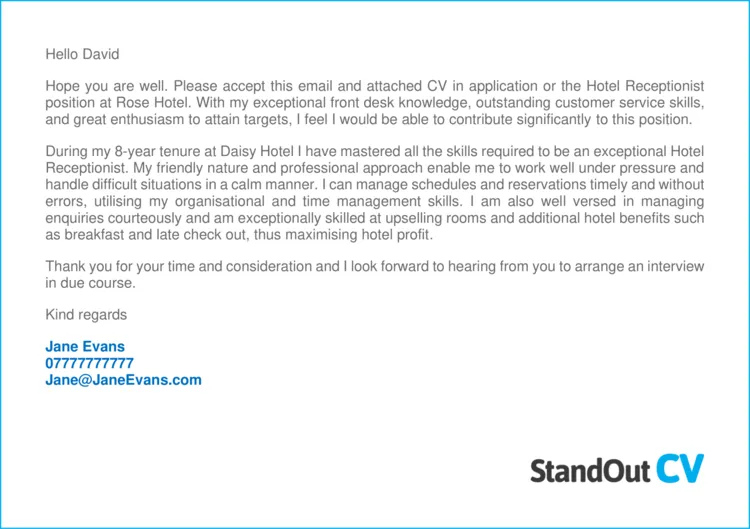
The format of your cover letter is just as important as its content. Use a standard business letter format. Include your contact information at the top, followed by the date and the recipient’s information. Use clear headings and paragraphs to organize your content. Keep the letter concise and easy to read, typically one page in length. Use a professional font and consistent formatting throughout the letter. Avoid excessive use of bolding, underlining, or italics. Ensure your cover letter is properly aligned and visually appealing. A well-formatted cover letter demonstrates your attention to detail and professionalism, which is crucial in the hospitality industry.
